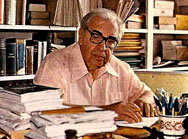It was almost midnight when, on May 13th, with a gunshot to the head, Pedro Nava, then 80 years old, one of the greatest memoirists in this country, committed suicide in the Glória neighborhood, in Rio de Janeiro, where he lived for four decades. With him, not only was buried what was needed to finish the seventh volume of his memoirs, "Cera das Almas", but also one of the biggest secrets ever revealed about his personality: a supposed repressed homosexual side. To rescue this controversial story that they tried to hush up at the time, we gathered excerpts from interviews and articles published in the media. Despite the evidence that Pedro had an affair with a prostitute, there are those who argue that everything is fiction. It will be?
Book reveals possible motive
The fact was resurrected in 2005 in the book "My story of others", by journalist Zuenir Ventura. In ten pages, in the chapter "A poorly told suicide", Zuenir tries to reconstruct the episode from twenty-five years ago. Then head of the Rio branch of Istoé magazine, he found the suicide story told by the newspapers two days after the incident, on May 15, 1984, unconvincing. Regarding the investigation, he commented: "We would start from scratch, because in the daily press there was no no indication or clue as to the causes of the suicide had emerged. Nava had left no explanation, note, nothing."
When consulting periodicals of the time, in fact, nothing was pointed out as a reason, other than a mysterious telephone call hours before. At least in the main Rio newspapers, "O Globo" and "Jornal do Brasil", there was talk, among other things, about what the previous day had been like, when Pedro was apparently calm, having even gone to a friend's house for a usual meeting.
Gay journalist rumor would be the first clue
Still according to Zuenir, days later, a rumor began to circulate in newsrooms that Nava had been blackmailed by a prostitute. "The source would be a gay reporter, a frequent visitor to Avenida Prado Júnior, a hotbed of prostitution (…) The author of the blackmail was a boy with whom Nava was having an affair and who presented himself in a newspaper classified as 'Beto da Prado Júnior' , which is how the writer met him" – he reveals.
Journalists Arthur Xexéo and José Castello were then assigned to find this Beto and obtain more details. They were well received by the boy, who confirmed the story, but denied any type of blackmail. According to Beto, the mysterious connection would have come from another person with whom he had sex in front of Nava, at the request of the writer himself, who had revealed his voyeur face. "The most I suspected was that he could have invented a third element when he was the one doing the blackmailing. But from his relationship with Nava, I left believing, there was no doubt about it. He sold the case as a perfect romance" – guarantees Xexéo.
Friends and family: "operation abafa"
Zuenir also says that a cousin of the couple, Silvana Gontijo, had become aware of the blackmail – although no one knows how – and asked that nothing be published. "While we were looking for information, Nava's friends were moving in the opposite direction. They wanted to prevent the image of the great writer from being 'tarnished', as they said. They were more concerned about not letting any reference to the Nava's sexuality than in discovering the cause of the suicide"- says Zuenir.
Ziraldo, a close friend of Nava, was one of those who were against publishing the story. "I don't believe that the reasons for a suicide – which would become a scandal – of an old and respected character on the Brazilian scene, with his widow still alive, his nephews and relatives still shocked by his death, was a journalist's duty" - he declared he.
One of Nava's greatest defenders of heterosexuality, however, is his nephew, doctor Pedro Penido. In an interview with Veja magazine, a few years ago, he repudiated the idea that his uncle had any type of repressed sexuality. "I lived with Nava and his wife, there was never any proof, much less suspicion, that their marriage was a sham. My uncle was obsessed with the subject of death. Furthermore, he went through periodic bouts of depression" - he declared.
Another defender is professor Ilma de Castro Barros Salgado, author of "Pedro Nava – women veiled and revealed". At the launch of her book, she declared about Pedro's supposed sexual fragility: "A stylistic peculiarity of Nava, which would explain such insinuations, is the fact that the author makes incessant use of pseudonyms that both enrich and open paths for dubious interpretations." She further stated that Pedro was "a big, expansive man, but extremely tormented, anguished and lonely".
Ethics or omission?
Shocked to obtain confirmation of the rumor, Zuenir chose not to publish the fact, confirming that the mystery of Nava's death remained in the air. Unfortunately, despite the intense debate, this stance was also adopted by other outlets, to "protect the writer's image". Furthermore, for Zuenir, other evidence was lacking. He insisted that the sources were unreliable, but confessed that the episode "violated the duty of a journalist." "The prejudice was more social than sexual (…) If it had been a modest football player or singer, we would have published it. By omitting the facts (…) we left without explanation, for the readers, a dramatic event that, yes, had a plausible explanation" – he said.
As for José Castelo, everything seemed very real. "It could have been true, why not? A lonely old writer, approaching death, coming to terms with his old ghosts and most secret repressions was perfectly believable" – he said in the book. Another who shares Castelo's opinion is journalist Flávio Pinheiro, then head of Veja's Rio branch, who also did not publish the story in full. "As much as he (Beto) had a side of exhibitionism, the signs that he had a relationship with Nava were very strong. The indications of the writer's way of speaking, the description of his clothes, among other details, demonstrated intimacy" – opines.
"Solidão Povoada": a revealing biography
Other signs of Nava's homosexuality – according to Zuenir – are subtly reported by the Frenchwoman Monique Le Moing in "Solitude populated, a biography of Pedro Nava". Released in 1986, the book originated from his doctoral thesis on the writer's work.
For years, Monique, who was a friend of Nava, researched her life, without forgetting to interview relatives and close friends, such as the poet Carlos Drummond de Andrade. It was based mainly on the final pages of Nava's last book, "Círio Perfeito". The excerpt, according to the author, presents several references to the topic. The book ends at the point where the Comendador character would make a bombastic revelation. The outcome would be made in the next volume, never finished. Other sources from the writer include statements by Pedro himself to the press in which he reports his opposition to hypocrisy and sexual taboos, such as this confession made in 1983: "Sexually speaking, I'm liberal, everyone has the right to do what they want."
In an interview with Folha de São Paulo, on 26/09/88, about her memoir, "So Many Years", writer Rachel de Queiroz reportedly said why she did not refer to her suicidal cousin's homosexuality. "His death was very recent. We were very close and he killed himself to hide it. So, we all respect it." After Monique addressed the matter, Pedro Penido, Nava's heir, decided not to renew the contract with the publisher Nova Fronteira and handed over his uncle's work to two other smaller publishers in São Paulo.
Sudden suicide
Pedro Nava was born in Juiz de Fora on June 05, 1906. Before becoming a writer, he was a rheumatologist. In 1968 he began writing the first volume of his memoirs, published between 1972 and 1983, in the order: "Bone Chest", "Captive Balloon", "Iron Floor", "Beira-mar", "Dark Cock " and "The perfect candle". The wealth of details and his style established him as the greatest Brazilian memoirist.
He was married twice – his first wife committed suicide after discovering she had leukemia – but never had children. Despite constantly writing about death, his suicide surprised everyone. In 1975, he began sending six friends, including Drummond, a letter with instructions on what to do with his body, such as using two liters of formaldehyde for embalming.
As published at the time, it was 20pm when Pedro and his wife were at home and the phone rang. He had just written the speech he would give to receive the title of Cidadão Fluminense and was waiting for Drummond's interview on TV Manchete, on the Diálogo program. His wife answered, saying it was a man. Pedro picked up the phone and listened to everything in silence. Afterwards, he hung up in a daze, saying it had been a "tasteless prank call". Without his wife noticing, he left the house with a 32 Taurus, purchased four years earlier without anyone's knowledge.
He wandered around Glória among transvestites and prostitutes until, around 23:30 pm, he shot himself in the head 200m from home. The police found the body twenty minutes later under a tree. Nava had only 36 pages ready for the seventh and final volume of his memoirs, "Wax of Souls." She also wrote poems. The most famous – O Defunto, from 1946 – was published by Manuel Bandeira in "Antologia de Poetas Bissextos Contemporâneos".



